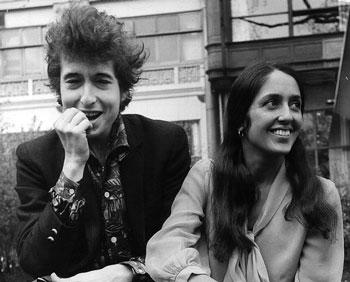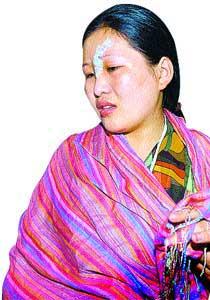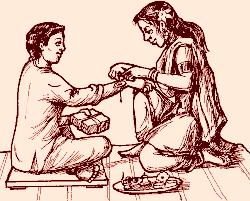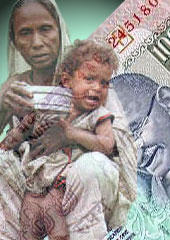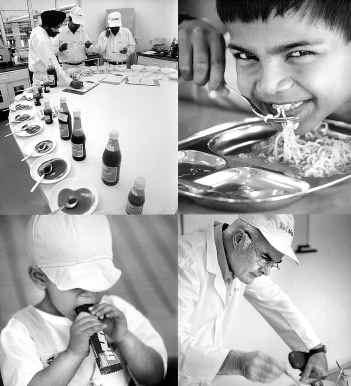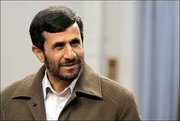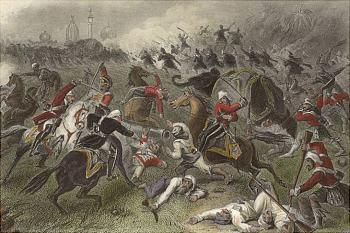
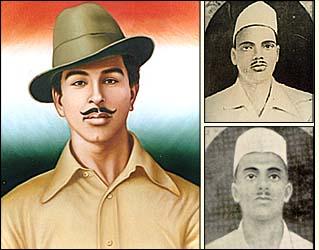
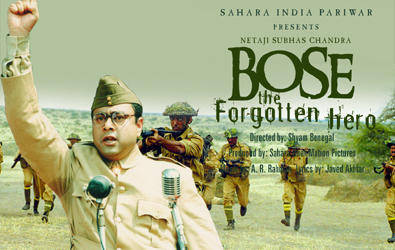

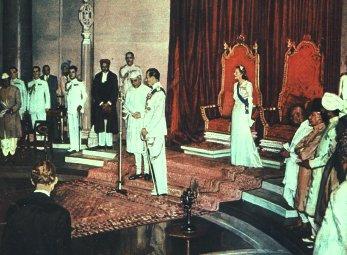
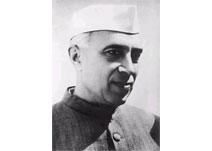
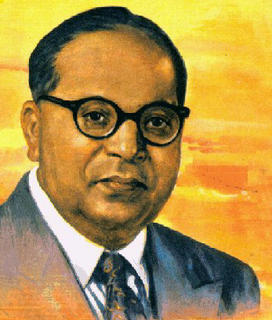


Tryst with Destiny 14-15 August, 1947
-Jawaharlal Nehru
With the clock striking the midnight hour on 14-15th August, 1947, India was 'to awake to freedom'.
The Constituent Assembly to whom power was to be transferred began its sitting at 11 pm with Smt Sucheta Kripalani singing Vande Mataram.
It was a historic and memorable occasion in the life of the Constituent Assembly.
After an address by the President, Jawaharlal Nehru made his now famous Tryst with
Destiny speech. He called upon the members to take a solemn pledge to serve India
and her people.
'Long years ago, we made a tryst with destiny, and now the time comes when we shall redeem
our pledge, not wholly or in full measure, but very substantially. At the stroke of the midnight hour, when the world sleeps, India will awake to life and freedom. A moment comes, which comes but rarely in history, when we step out from the old to the new, when an age ends, and
when the soul of a nation, long suppressed, finds utterance. It is fitting that at this solemn moment we take the pledge of dedication to the service of India and her people and to ..... '
Hear the speech on audio go here http://www.harappa.com/sounds/nehru.htmlThe Story of India's Freedom Struggleread it here http://www.kamat.com/kalranga/freedom/ PS: Mahatma Gandhi was conspicious by his absenceHe was in mourninga few days later Jinnah raised the crescent in PakistanBose was assumed to be dead for a better I-day post go to http://caraf.blogspot.com/2005/08/58-years-ago-ancient-people-reaffirmed.html#comments Text of Prime Minister's Independence day speechAugust 15, 2005 11:34 IST
Following is the text of Prime Minister Manmohan Singh's address from the Red Fort on Monday.
My dear countrymen, brothers and sisters and dear children, today is once again a day of joy and happiness when we all gather to celebrate the anniversary of our Independence.On this sacred occasion, I greet you all.
Fifty eight years ago, Pandit Jawaharlal Nehru had unfurled this glorious tricolour for the first time from this historical place, thus fulfilling the centuries-old dream of crores of Indians to be independent from foreign rule.
Next year, we will commence the celebrations of the 150th anniversary of the First Battle of Independence. Through the celebrations, we will have a chance to once again remember the glorious freedom fighters of that great battle who had laid the foundations for our independence.
In 1857, Bahadurshah Zafar had declared the Battle for Independence from this same historic Red Fort. The battle cry of Rani of Jhansi Lakshmi Bai, Peshwa Nana Saheb, Tantia Tope and Begum
Hazrat Mahal of Lucknow was 'Delhi Chalo'. This cry was renewed with vigour and force by Netaji Subhash Chandra Bose and in 1947 this ambition was fulfilled. Today, we have the opportunity of remembering their sacrifices. We can also learn from their enthusiasm and self-confidence, a number of traits which will be useful in facing today's challenges as well.
Today is a day when we feel proud of and celebrate our victory in the struggle for independence. This is a day of joy and happiness for all Indians, irrespective of where they reside in any part of the world.
It is also a day on which we remember our valiant soldiers and security forces, thank themfor their bravery and commitment, and hope that they will continue to be alert in the service of the nation.
Mahatma Gandhiji had also dreamt of the same independence when he launched the Dandi March 75 years ago. Through that struggle, he shook the foundations of the greatest and most powerful empire the world had ever seen.
Today, we need to once again remember the sacrifice and commitment of the Father of the Nation Mahatma Gandhi and also his dreams for an independent nation. We also need to reflect on how far we have been successful in fulfilling his dreams.
What was the dream Gandhiji had of an independent India? He had said, "I will work for an India where the poorest of the poor feel that this country and this nation belongs to them and that they have a major role in its construction. An India where there is no higher class or lower class among all people. An India where all communities live in friendship and harmony. An India where women have the same rights as men."
He had also said: "The Swaraj I dream of is a Swaraj of poor people. I have not the slightest hesitation in saying that Swaraj cannot be complete till the poorest have a guarantee of being provided with the basic necessities of life."
Have we come anywhere near this dream?
In the last 1 year, our attempt has been to build the India of Gandhiji's dream. The goal of our government's National Common Minimum Programme is also the same. Last year, on this very day, I had said from the Red Fort that I have no promises to make but only promises to keep. In order to fulfil the promises, we have taken many important steps and have taken major decisions which will contribute to our nation's progress. While taking these decisions, the focus of our thoughts and attention has always been the aam aadmi. The effort of our government has been that while we continue to make rapid economic progress, the benefits of this progress and growth must reach all sections of society in a fair manner. Our vision is not just of economic growth, but also of a growth which would improve the life of the aam aadmi. Our country is witnessing unprecedented economic growth at this point in time. Last year, our economic growth rate was 7 per cent and it is likely to be similar this year as well. Our country has never witnessed such consistently high growth rates in the past. I am confident that if we maintain this momentum of growth for the next 5-10 years, then it would be possible for us to eradicate poverty, ignorance, hunger and disease from our country. This is not a dream but something that is possible in our times.
It is not only us but the entire world, which is viewing India as an emerging power of these times. The whole world is eagerly watching the manner in which India is making rapid economic progress. And this economic growth is happening within the framework of a liberal democracy. Our country is a multi-cultural, multi-religious, multi-lingual and multi-ethnic nation. Nowhere in the world do we have an example of a country of a 100 crore people seeking their economic and social destiny within the framework of a democracy.
It is because of this that the entire world's attention is riveted on us. It is the result of our combined hard work that India today has made its mark on the world stage and we feel proud of our standing in the comity of nations. Brothers and sisters, it is my belief that India's future is extremely bright and that this future is indeed, possible. In order to achieve this, we need to focus on achieving rapid economic growth and on ensuring social justice.
It is only by walking on these two legs will we be able to ensure that the benefits of growth reach all sections of society. Last year, while addressing the nation on this day, I had mentioned that our growth is critically dependent on 7 sectors which I called the "Saat Sutras". These 7 sectors were agriculture, irrigation, education, health, employment, urban renewal and infrastructure.
Today, we can review the progress made in these 7 areas. Our maximum emphasis has been on agriculture. Farmers are the backbone of our country and of our economy. It is the result of their tireless efforts that we do not have any shortage of foodgrains in our country.
The entire country is grateful to them for this.
We must admit that the economic growth we have been referring to earlier has not yet fully reached every individual in our society. This is particularly true in our rural areas. The growth in agriculture has not been at the required pace.
Even today, over 60 per cent of our population is dependent on agriculture and every farmer has a right to be a participant in our economic growth processes. Hence, we have talked about giving a "new deal" to our farmers. We have taken a number of steps to alleviate the problems of our farmers, such as improving and enhancing the flow of agricultural credit, increasing investment opportunities and storage facilities, launching a National Horticulture Mission to increase the output and trade in fruits and vegetables, and promoting research and training in agriculture. It is our goal that by 2007, there should be a Krishi Vigyan Kendra in every district. Through this, the benefits of advanced research and training will reach all our rural bretheren. Large parts of our country are still dependent on rainfall and we will focus on removing the problems of farmers in dry land areas.
We are considering setting up a National Rainfed Area Authority for this purpose. It is our hope that in the coming years, agricultural growth becomes rapid and we have a new green revolution. We are fully committed to achieving this. It is not possible for our rural areas to develop in the absence of basic infrastructural facilities. In order to improve basic infrastructure in rural areas, we have conceived an ambitious programme called 'Bharat Nirman.'
In Bharat Nirman, 1 crore hectares of unirrigated land will be irrigated. All villages whose population is 1000 or more, and 500 or more in hilly areas, will be connected with roads. Two and a half crore houses will be given electricity connections, and through this, the entire country will be electrified. Over 60 lakh houses will be built in villages. The remaining 74,000 habitations which do not have access to safe drinking water will be provided these facilities. Each and every village will have at least one telephone connection. I am confident that Bharat Nirman will ensure the rapid economic development of our rural areas.
In all our economic programmes, our policy has been to ensure the participation of the common man, particularly of those in rural areas. They should feel that all programmes belong to them. We have believed that the proper institutional mechanism to ensure their participation in the Panchayat system. Shri Rajiv Gandhiji had dreamt of Panchayati Raj many years ago. Today, zila, tehsil and village panchayats have a major responsibility to discharge. Our Constitution has placed the responsibility on panchayats, not only of ensuring economic development but also delivering social justice. Bharat Nirman provides a unique opportunity to our panchayats to shoulder this immense responsibility by effectively implementing this programme. I am confident that panchayats will ensure Bharat Nirman becomes a milestone in our development process. We are giving importance not only to our rural areas but also to the economic conditions in our urban areas. Today, a third of our population lives in urban areas and keeping in mind the speed at which urbanisation is taking place, the day is not far off when over 50 per cent of India's population will be residing in urban areas.
The foundations of our culture and society were laid thousands of years ago in the cities on the banks of Indus River. We taught the world the basic concepts of urban planning. However, today our cities are often unable to meet the basic needs of their residents on many counts. We will be investing in urban areas and for this, a National Urban Renewal Mission has been launched. We have a large proportion of young people in our population. We will need to invest in their education and health so that their future prospects are bright. By doing so, our population will become our biggest asset.
It is necessary for every section of society to be literate and educated so that they can take advantage of our growth processes. By strengthening Sarva Shiksha Abhiyan, we are trying to ensure universalisation of primary education. We are giving special emphasis to the education of the girl child. We need to make education joyful, interesting and meaningful so that children develop a desire to go to school. We need to pay particular attention to the education of first generation learners. We are resolute in our commitment to see that no child is deprived of the benefit of primary education. It is our hope that in the near future, women are as literate as men. In order to achieve these goals, resources shall not be a constraint. We are also committed to providingeducation to disabled children as well.
Along with primary education, we also need to pay attention to higher education. If India is seen around the world as a rising knowledge power, it is because of our universities and research institutions. If we want to maintain our rapid economic growth, we need to improve the quality of these institutions and also create many more such institutions. Let us resolve to achieve excellence in academic work in the 150th anniversary year of the Universities of Kolkata, Mumbai and Chennai. However educated an individual may be, it is necessary for the person to be healthy in order to lead a happy life.
Through the National Rural Health Mission, we will provide the best primary health care facilities in each and every village. We are confident that by providing excellent primary health care, we will be able to improve the health of young mothers and children which will then lead to a consequent reduction in our population growth rate.
In the last 50 years, we have been able to control and eliminate many diseases which have been a scourge in our country. Leprosy has been eliminated in 25 states. Polio and Tuberclosis are also being gradually brought under control.
AIDS is now becoming a major national problem and we need to tackle this on a war-footing. We need to have a mass movement to ensure that this disease is rapidly checked and its growth arrested. We will also ensure that medicines are available to common people at reasonable prices.
As I had mentioned earlier, the true test of development is the number of people who have secured employment and the number of families who have prospered as a result. As long as there is widespread unemployment in the country, we cannot claim that we are truly independent.
It is with this goal in mind that Indira Gandhi had given the nation the goal of "Garibi Hatao".
Today, if we need to remove poverty, we need to create employment "Rozgar Badhao". In order to ensure that a minimum level of employment is available to everyone in rural areas, it is necessary to have an employment guarantee. The National Rural Employment Guarantee Bill has been prepared with this goal in mind. We hope that this act will bring about a revolutionary change in the lives of people in rural India. We are also revamping the Khadi and Village Industries Commission so that more employment is generated through small and village industries. In order to ensure that our economic growth does not slow down, it is necessary to have strong infrastructure. Economic growth is intrinsically linked to the availability of infrastructure. Railways, roads and electricity are important elements of infrastructure. In order to improve our railways, a rail modernisation programme has been prepared so that our railways become one of the best in the world. A dedicated freight corridor is being developed between Delhi-Kolkata and Delhi-Mumbai by investing over Rs. 25,000 crore rupees.
The development of our national highways is progressing at a rapid pace. We have begun work on an additional 30,000 km of highways and we will soon be six-laning the Golden Quadrilateral. There has been tremendous progress in civil aviation. World class airports are being constructed in many cities. Ports are being modernised and many new ports are under construction. Shortage of electricity is still a major inconvenience. Electricity is an essential ingredient of economic development. We need to ensure that electricity generation grows rapidly and that power shortages are eliminated.
We need far greater investment in this sector. I have often said that, excepting for the poorest sections of society, giving electricity free of cost to other sections will worsen the financial condition of our electric utilities.
We need to get used to paying a reasonable price for electricity just as we do for petroleum products. Through this, we can ensure supply of electricity in the right quantity, at the right time and of right quality. In my visit to the United States, we have managed to reduce some of the constraints which have been hampering the growth of our nuclear energy programme and in the next 10 years, in addition to the 1,50,000 MW of capacity being added in the thermal andhydro sectors, another 40,000 MW could be generated through nuclear energy.
While rapid economic growth is one facet of our vision for the nation, social justice and equitable development is the other facet. Last year, our greatest contribution to the nation has been to bring it back on the path of rapid economic growth.
There is a ray of hope in the lives of all weaker sections of society. There is an atmosphere of calm, peace and communal harmony all around the country. We believe that this is an important achievement.
In our country, scheduled castes, scheduled tribes, backward classes and women suffer from many disabilities. Many of them have been discriminated against for centuries. It is essential that they are made stakeholders and participants in our development processes. We are committed to paying attention to their education, health and basic necessities. We have taken some steps to improve their economic and social status. A bill has been introduced in Parliament on reservation in government employment.
It will be our effort now to increase the opportunities for employment and equal opportunities in employment outside government. Our Adivasi brothers have been cultivating land near forests for many generations. However, they do not have any rights on this land owing to which they live in constant fear of eviction. Their rights were snatched away from them 150 years ago during British rule. In order to correct this, we are bringing a legislation which will benefit scheduled tribes living in forests while at the same time ensuring conservation of our natural heritage.
Our Constitution provides for equality of all religions. All religions are safe and secure within our Republic. It is essential that minorities should have every opportunity of carrying on their daily activities with a feeling of security and happiness. This is also our goal. Hence we have repealed POTA.
As a result, many sections of society are able to breathe easy. We have commissioned a report on the social economic status of minorities. This is being done for the first time and will be the basis for all our policy interventions for improving their status.
We will also revive and revamp the 15 Point Programme for Minorities. The New 15 Point Programme will have definite goals which are to be achieved in a specific time frame. We are going to start a special development programme which will focus on the skill enhancement of artisans and weavers, many of whom are minorities. This will help improve their incomes.
Industrial growth is the result of the sweat and toil of our working classes. This year, our industrial growth in May has exceeded 10 per cent. I would like to congratulate all our workers for this magnificent result. The government will pay specific attention towards addressing the problems of workers, particularly those in the unorganised sector. It is our hope that we will be able to provide a social security net for them so that they do not feel insecure in times of distress.
However, I would like to emphasise that workers too have a responsibility. Wherever they may be working, in factories or in firms, they should work in cooperation with the management so that profitability of enterprises increases and they also benefit from this.
Women are the backbone not only of our homes but also of our nation. We need to strengthen their hands and empower them fully. We have brought legislation to prevent domestic violence against women and to secure their property rights. We will also ensure reservation for women in Parliament and Legislative Assemblies.
In order to provide an opportunity for our youth and sportspersons to demonstrate their skills, we will make all possible efforts to ensure that India once again hosts the Asian Games in Delhi, the first since 1982. In this new phase of development, we are acutely aware that all regions of the country should develop at the same pace. It is unacceptable for us to see any region of the country left behind other regions in this quest for development. In every scheme of the government, we will be making all efforts to ensure that backward regions are adequately taken care of. This has been ensured in the Food for Work Programme and the National Rural Health Mission.
We will also focus on the development of our border areas. We will ensure that these regions are provided basic infrastructure such as roads, electricity and telephone connectivity in the next 3-4 years. Our rivers are the lifelines of the country. They are the foundations of our ancient civilisation.
Today the demand for water is growing all around. In the 21st century, water will be the most precious commodity and its shortage will be felt all around. We need to launch a national movement to prevent the wastage of water and for its efficient use. This is anabsolute necessity. It is also necessary that all states of our country work together in a spirit of give and take and a spirit of mutual understanding to sort out all contentious issues amicably so that everyone is benefitted. We also need to pay special attention to our environment. We need to start a national campaign for cleanliness so that our cities, towns, villages, roads, streets and homes are neat and clean.
Gandhiji used to emphasise this aspect in his ashram as well. We need to stop the pollution of our rivers and atmosphere. We need to protect our forests and natural heritage. We must remember that we are only the custodians of our environment and it is our responsibility to preserve and pass it on to our future generations.
In the recent past, natural calamities have affected many parts of our country with disastrous effects on people and property. A tsunami in December, snowfall in January and floods in July.
Lot of people have lost their precious lives in these calamities. The entire nation's sympathies are with the bereaved families. I am confident that we will face the problems of floods in a united manner, just we faced the devastation caused by the tsunami.
Last month, Mumbai suffered immense damage and lost many lives because of unprecedented floods. In these difficult circumstances, the citizens of Mumbai have shown courage, fortitude and patience in dealing with the enormous problems and have demonstrated the qualities which make Mumbai different from other cities. I would like to assure that we will provide whatever assistance is required to ensure that Mumbai, Maharashtra, Gujarat and Karnataka are restored to normalcy. In order to effectively tackle such natural calamities, we have constituted a National Disaster Management Authority.
Through this, and by using the latest technologies, we hope to face future calamities in a much better manner.
In the country, we still have regions such as Jammu & Kashmir and the North-East where complete peace and tranquility does not exist. The people in these regions are the victims of violence and terrorism. Wherever conditions deteriorate we take the assistance of our armed forces. Wherever we have taken their assistance, they have shown patience and perseverance.
Many of them have lost their lives. In order to ensure that the children of soldiers who have laid down their lives in the service of the nation get good education, we are starting a Prime Minister's Scholarship Scheme.
Each year, 5000 children would be provided scholarships for college education.
However, accidents do happen once in a while. Keeping this in mind and with a view to protecting human rights, the government had set up a Committee to look into the provisions of the Armed Forces Special Powers Act. The Report of this Committee is being examined in detail and we will take all necessary steps so that there are no violations of human rights under this Act. As a result of our policy in Jammu & Kashmir, the state is once again on the path of peace and progress. It is our humanitarian obligation that we assist the state in all possible ways so that the people there can live in peace and harmony. Terrorists have never been the friends of the people of Kashmir. As long as they continue their terrorist attacks, our armed Forces will be alert and give them a fitting response.
In this conflict, common citizens may also be affected at times. I have said before and I am repeating once again, that there is no issue that cannot be resolved through a process of discussion and dialogue. Our doors are always open and will continue to be open for anyone interested in dialogue. I invite everyone to join us to discuss the problems of the state of Jammu & Kashmir so that its people can lead a life of peace and dignity.
If violence continues, then our response too will be hard. I am aware that the Government of Pakistan has put some checks on the activities of terrorists from its soil. However, it is not possible to achieve success through half-hearted efforts. It is necessary that the entire infrastructure of terrorism is totally dismantled.
In the context of terrorism and extremism, development and security have an intrinsic relationship. We have managed to face extremism successfully through a democratic process. However, it is imperative that a democratic government should be able to differentiate between the genuine problems of people and the designs of terrorists.
Today, there are a number of challenges in our security environment such as terrorism, communal violence, atrocities on women and exploitation of dalits and adivasis. Our security forces have been facing the daunting task of controlling extremist violence admirably. Extremism is a challenge which requires a united response from all of us. However, it is also necessary to look at a political resolution of this problem. Often extremism has its roots in backwardness and lack of economic development. It is not easy to handle problem of extremism in violation. However, by addressing it in all its dimensions social, political, economic and security in an integrated manner, I am confident that we will be successful in checking it.
India has always been a country which loves peace. Its destiny is intrinsically linked to those of its neighbours. Our goal has always been the prosperity and happiness of our citizens. Hence, we have always sought the friendship of our neighbours, although at times, this has not been fully successful. There seems to be some success in our search for peace and harmony now. Many problems of South Asia are similar, of which poverty and illiteracy are the most widespread. It is possible for us to eliminate these in the region by working together.
The composite dialogue process with Pakistan is continuing. As a result, we have been able to reopen the Srinagar-Muzaffarabad highway which was a long pending demand of the people and restarted the bus service on this route, a step which has been widely welcomed. Talks are going on to open similar links from points in other states.
Discussions are also going on a gas pipeline from Iran to India via Pakistan. Once this is completed, we will be able to address a major constraint affecting our economy.
It is our sincere hope that we work with all our neighbours in South Asia to effectively address the challenges of poverty, unemployment and disease. If India and Pakistan are able to work together, than we will have many opportunities for making our countries prosperous. I am confident that we will be able to fulfill this vision.
We have had historic links and relations with Afghanistan. It is our desire to see Afghanistan prosperous and strong. In a few days, I will be going to Afghanistan. We will try to strengthen and support democracy and economic growth in all possible ways.
Our largest neighbour is China with whom we have a centuries old relationship, a relationship from which both of us have learnt a lot and imbibed a lot. We are today willing and ready to deepen our trade and cultural relations with China for the benefit of the two nations. The agreement arrived at between our two countries in April has paved the way for a closer relationship. I greet the people of Sri Lanka, Mauritius, Nepal, Bangladesh, Bhutan, Maldives and Myanmar and assure them with utmost sincerity that India is willing to work together with them for promoting development, prosperity and peace in the region.
My visit to the United States has been a major step in promoting friendship with that country. By deepening our economic and technological relations, we will be accelerating our own growth.
Simultaneously, our two democracies can work together to strengthen democracy in the world.
Russia is an old friend who has helped us in difficult times. We will deepen our friendly relations with Russia.
We also wish to deepen our relations with the countries to the east. The recently concluded trade agreement with Singapore is a major step in improving our economic engagement with the region. We will be entering into many more such agreements in future.
At this point, I would like to emphasise that the contribution of Indians and persons of Indian origin settled abroad in ensuing that our efforts are successful is enormous. They have not only travelled to far off lands to achieve their dreams of prosperity for themselves and their children, but have also played a stellar role in changing the world's perception of India. The world today sees India as a major knowledge power whose people are skilled, competent, hard working and peace loving.
Even within our own country, our scientists, doctors, engineers and scholars have contributed substantially in the achievements of our nation. We are proud of all of them. To conclude, I would like to say that the biggest challenge in running a government is to ensure that development programmes are implemented in an effective manner.
We will ensure that our outlays of expenditure are visible to citizens as outcomes of progress. The central government, state governments and panchayats have to work together so that the expectations of people are fulfilled. If we have to achieve results, there is a need to change the manner in which governments function.
There is no space in our government or in our society for corruption and arbitrary action. We are not prepared to tolerate this at any cost. Government servants must work with a sense of public service and they should be held accountable to the people. Governments will have to be made more transparent and accountable. The recently passed Right to Information Act is a landmark step in this direction.
India is on the road to progress. The whole world is watching us with expectation. It is possible for us to eradicate poverty, ignorance and disease within our lifetime. This has been made possible by the advances in science and technology.
There comes a time in the history of a nation when it can be said that the time has come to make history. We are today at the threshold of such an era. The world wants us to do well and take our rightful place on the world stage. There are no external constraints on our development. If there are any hurdles, they are internal. We must seize this moment and grab this opportunity. We need to have the resolve to make our country prosperous. We must have the self confidence to realise that we are second to none, that Indians are as good as the best. Our political system and leadership must show sagacity, wisdom and foresight so that we are able to make the best of this moment and make India a truly great nation.
Let us come together, as one nation, strengthened by our plurality, to work shoulder to shoulder and build a new India. An India where there are no barriers between the government and the people. An India where each and every Indian can stand proudly and proclaim that he is an Indian.
Let us work together to build such a nation. Dear children, join me and say "Jai Hind", "Jai Hind", "Jai Hind".
President's address to the nation on the eve of 59th Independence DayAugust 14, 2005 18:46 IST
Energy Independence
My Dear Citizens of India,
On the eve of the 59th Independence Day, I extend to you my best wishes for your happiness and prosperity. My greetings to all our people at home and abroad. Let us resolve, on this occasion, to remember with gratitude, the selfless and devoted services of our armed forces who are guarding our frontiers on the land, over the sea, and in the air.
We are also grateful to the paramilitary and police forces for preserving our internal security and maintaining law and order. I met 137 freedom fighters from 27 states and union territories on August 9, 2005, at Rashtrapati Bhavan. I saw their enthusiasm even at their ripe age, to bring back nationalism as a living movement. Today our country is free, because freedom fighters gave their best to the nation in their prime of youth. Honouring freedom fighters is honouring the independent nation and its spirit of nationalism. We must thank them with respect and make their lives happy.
Nature's Fury and its Management
While we are celebrating the 59th anniversary of our hard earned political independence, we have to remember the sufferings of our people affected by the recent rains and floods in Maharashtra, Gujarat, Madhya Pradesh, Himachal Pradesh, Karnataka and Orissa. The city of Mumbai and other areas in Maharashtra bore the brunt of nature's fury.
Terrible Tuesday: Mumbai copes with a calamity
The people of these areas are meeting the challenge with courage and fortitude. The prime minister had visited some of the affected areas. I spoke to the chief minister of Maharashtra while he was visiting various places affected by the floods and I also shared my concern with other chief ministers. Maharashtra needs help at this critical juncture to mitigate the sufferings arising out of loss of life and properties inflicted by the fury of the rains and floods. All the states need to express their solidarity with the people of Maharashtra in their time of distress and suffering and collectively help in removing the pain of the people. Mumbai needs an urgent reconstruction to face unexpected heavy rains, as it happened this year.
Rainfall and Floods: Rainfall and floods are annual features in many parts of the country. Instead of thinking about interlinking of rivers only at times of flood and drought, it is time that we implement this programme with a great sense of urgency. We need to make an effort to overcome various hurdles in our way to the implementation of this major project. I feel that it has the promise of freeing the country from the endless cycle of floods and droughts. Also, as a measure for preventing flooding of streets in cities due to heavy sustained downpour, I would suggest the Ministry of Urban Development at the Centre and the state governments to mount a programme to rebuild and modernise the infrastructure and storm-water drainage systems including construction of under ground water silos to store excess water.
This water can be treated, processed and used at the time of shortages as practiced in many other countries. Fortunately India has adequate technology and expertise in making underground tunnels for the metro rail system. This technology can be used for constructing underground water storage systems.
Earthquake Forecasting: Another natural phenomenon that affects and causes damages of high magnitude without pre-warning in many parts of our country is the earthquake. To prevent heavy damage to the people and property, we need to accelerate research for forecasting earthquakes. Research work on earthquake forecasting is being done in many countries. We in India should have an integrated research team consisting of experts drawn from academia, meteorology and space departments for creating earthquake forecast modeling using pre-earthquake and post-earthquake data collected from various earthquake occurrences in our country. This can be validated periodically with the proven forecasting data available from other countries.
Earth Systems Science: Many of the countries in the world have experienced successive calamities driven by nature. Till recently, researchers the world over had been pursuing research in unconnected ways, in climate, earthquakes, ocean sciences and earth sciences, without realising the latent, but tight coupling between these areas. This new realisation has prompted many countries to pursue the interdisciplinary area of research, which is now known as earth systems science. It is in fact fast emerging as an area of convergence between earth, climate, ocean, environment, instrumentation and computer sciences. I strongly suggest that India should mount a programme in this emerging area of earth systems science. This will call for a dedicated, cohesive and seamless integration between researchers in multiple areas and in multiple organisations. Further, earth systems science does not obey political or geographical borders. It is truly a science and its intensive results would make our planet safe and prosperous.
Unlike research in strategic areas, wherein nations have to maintain superiority over other nations, earth systems science is the ultimate realisation of human kind to collaborate, since no nation is safe, if its neighbours are not. Nature's fury knows no borders.
Dear citizens, on January 26, 2005, I discussed with you the potential for employment generation in eight areas. I am happy that a number of actions are evolving.
Energy Independence
Today on this 59th Independence Day, I would like to discuss with all of you another important area that is 'energy security' as a transition to total 'energy independence'.
Energy is the lifeline of modern societies. But today, India has 17% of the world's population and just 0.8% of the world's known oil and natural gas resources. We might expand the use of our coal reserves for some time and that too at a cost and with environmental challenges. The climate of the globe as a whole is changing. Our water resources are also diminishing at a faster rate. As it is said, energy and water demand will soon surely be a defining characteristic of our people's life in the 21st Century.
Energy security rests on two principles. The first, to use the least amount of energy to provide services and cut down energy losses. The second, to secure access to all sources of energy including coal, oil and gas supplies worldwide, till the end of the fossil fuel era, which is fast approaching. Simultaneously, we should access technologies to provide a diverse supply of reliable, affordable and environmentally sustainable energy.
As you all know, our annual requirement of oil is 114 million tonnes. A significant part of this is consumed in the transportation sector. We produce only about 25% of our total requirement. The presently known resources and future exploration of oil and gas may give mixed results. The import cost today of oil and natural gas is over Rs 120,000 crore. Oil and gas prices are escalating; the barrel cost of oil has doubled within a year. This situation has to be combated.
Energy scurity, which means ensuring that our country can supply lifeline energy to all its citizens, at affordable costs at all times, is thus a very important and significant need and is an essential step forward. But it must be considered as a transition strategy, to enable us to achieve our real goal that is -- energy independence or an economy which will function well with total freedom from oil, gas or coal imports. Is it possible?
Hence, energy independence has to be our nation's first and highest priority. We must be determined to achieve this within the next 25 years, therefore by the year 2030. This one major 25-year national mission must be formulated, funds guaranteed, and leadership entrusted without delay as public-private partnerships to our younger generation, now in their 30s, as their lifetime mission in a renewed drive for nation-building.
Goals and Policies Now friends, I would now like to discuss with you some goals, strategies and policies for a major national mission to attain energy independence.
Energy Consumption Pattern in India in 2005: We have to critically look at the need for energy independence in different ways in its two major sectors: Electric power generation and transportation. At present, we have an installed capacity of about 121,000 MW of electricity, which is 3% of the world capacity. We also depend on oil to the extent of 114 million tonnes every year, 75% of which is imported and used almost entirely in the Transportation sector.
Forecasts of our energy requirements by 2030, when our population may touch 1.4 billion people, indicate that demand from the power sector will increase from the existing 120,000 MW to about 400,000 MW. This assumes an energy growth rate of 5% per annum.
Electric Power Generation Sector: Electric power generation in India now accesses four basic energy sources: Fossil fuels such as oil, natural gas and coal; hydroelectricity; nuclear power; and renewable energy sources such as bio-fuels, solar, biomass, wind and ocean.
Fortunately for us, 89% of energy used for power generation today is indigeneous, from coal (56%), hydroelectricity (25%), nuclear power (3%) and renewable (5%). Solar energy segment contributes just 0.2% of our energy production.
Energy Independence in Electric Power Generation
Thus it would be seen that only 11% of electric power generation is dependent on oil and natural gas, which is mostly imported at enormous cost. Only 1% of oil is (about 2 to 3 million tonnes of oil) being used every year for producing electricity. However, power generation to the extent of 10% is dependent on high cost gas supplies. We are making efforts to access natural gas from other countries.
Now I shall discuss another fossil fuel, coal. Even though India has abundant quantities of coal, it is constrained to regional locations, high ash content, affecting the thermal efficiency of our power plants, and also there are environmental concerns. Thus, a movement towards energy independence would demand accelerated work in operationalising the production of energy from the coal sector through integrated gasification and combined cycle route. In 2030, the total energy requirement would be 400,000 MW. At that time, the power generated from coal-based power plants would increase from the existing 67,000 MW to 200,000 MW. This would demand significant build-up of thermal power stations and large-scale expansion of coalfields.
Changing Structure of Energy Sources: The strategic goals for energy independence by 2030 would thus call for a shift in the structure of energy sources. Firstly, fossil fuel imports need to be minimised and secure access to be ensured. Maximum hydro and nuclear power potential should be tapped. The most significant aspect, however, would be that the power generated through renewable energy technologies may target 20 to 25% against the present 5%. It would be evident that for true energy independence, a major shift in the structure of energy sources from fossil to renewable energy sources is mandated.
Solar farms
Solar energy in particular requires unique, massive applications in the agricultural sector, where farmers need electricity exclusively in the daytime. This could be the primary demand driver for solar energy. Our farmers demand for electric power today is significantly high to make solar energy economical in large scale.
Shortages of water, both for drinking and farming operations, can be met by large-scale seawater desalination and pumping inland using solar energy, supplemented by bio-fuels wherever necessary.
The current high capital costs of solar power stations can be reduced by gridlocked 100 MW sized Very Large Scale Solar Photovoltaic or Solar Thermal Power Stations. In the very near future, breakthroughs in nanotechnologies promise significant increase in solar cell efficiencies from current 15% values to over 50% levels. These would in turn reduce the cost of solar energy production. Our science laboratories should mount an Research & Development Programme for developing high efficiency CNT based Photo Voltaic Cells.
We thus need to embark on a major national programme in solar energy systems and technologies, for both large, centralised applications as well as small, decentralised requirements concurrently, for applications in both rural and urban areas.
Nuclear Energy
Nuclear power generation has been given a thrust by the use of uranium-based fuel. However, there would be a requirement for a 10-fold increase in nuclear power generation even to attain a reasonable degree of energy self-sufficiency for our country. Therefore, it is essential to pursue the development of nuclear power using thorium, reserves which are higher in the country. Technology development has to be accelerated for thorium-based reactors since the raw material for thorium is abundantly available in our country. Also, nuclear fusion research needs to be progressed with international cooperation to keep the option for meeting the large power requirement, at a time when fossil fuels get depleted.
Power through Municipal Waste
In the power generation sector of the energy economy, we need to fully use technologies now available for generating power from municipal waste. Today, two plants are operational in India, each plant generating 6.5 MW of electric power. Studies indicate that as much as 5800 MW of power can be generated by setting up 900 electric power plants spread over in different parts of the country, which can be fueled by municipal waste. Electric power generation and creation of clean environment are the twin advantages.
Power System Loss Reduction: Apart from generating power and running power stations efficiently without interruption, it is equally essential to transmit and distribute power with minimum loss. The loss of power in transmission and distribution in our country is currently in the region of 30 to 40% for a variety of reasons. Of about 1,000 billion units of electrical energy produced annually, only 600 billion units reach the consumer. This is the result of transmission loss and unaccounted loss. We need to take urgent action to bring down this loss to 15% from 30 to 40% by close monitoring of losses, improving efficiency and increasing the power factor through modern technology. By this one action alone, we will be able to avoid the need for additional investment of around Rs 70,000 crore for establishing additional generating capacity.
Transportation Sector
The Transportation sector is the fastest growing energy consumer. It now consumes nearly 112 million tonnes of oil annually, and is critically important for our nation's economy and security. The complete substitution of oil imports for the Transportation sectors is the biggest and toughest challenge for India.
Use of biofuels: We have nearly 60 million hectares of wasteland, of which 30 million hectares are available for energy plantations like 'Jatropha'. Once grown, the crop has a life of 50 years. Each acre will produce about 2 tonnes of bio-diesel at about Rs 20 per litre. Biodiesel is carbon neutral and many valuable by-products flow from this agro-industry. Intensive research is needed to burn bio-fuel in internal combustion engines with high efficiency and this needs to be an urgent R&D programme. India has the potential to produce nearly 60 million tones of bio-fuel annually, thus making a significant and important contribution to the goal of energy independence.
The Indian Railways have already taken a significant step of running two passenger locomotives (Thanjavur to Nagore section) and six trains of diesel multiple units (Tiruchirapalli to Lalgudi, Dindigul and Karur sections) with a 5% blend of bio-fuel sourced from its in-house esterification plants. In addition, they have planted 75 lakh Jatropha saplings on railway land, which is expected to give yields from the current year onwards. This is a pioneering example for many other organisations to follow. Similarly, many states in our country have energy plantations. What is needed is a full economic chain from farming, harvesting, extraction to esterification, blending and marketing. Apart from employment generation, bio-fuel has a significant potential to lead our country towards energy independence.
The other critical options are development of electric vehicles; hydrogen based vehicles, electrification of railways and urban mass transportation.
Conclusion
By 2020, the nation should achieve comprehensive energy security through enhancement of our oil and gas exploration and production worldwide. By the year 2030, India should achieve energy independence through solar power and other forms of renewable energy; maximise the utilisation of hydro and nuclear power and enhance bio-fuel production through large-scale energy plantations like Jatropha.
We need to evolve a comprehensive renewable energy policy for energy independence within a year. This should address all issues relating to generation of energy through wind, solar, geothermal, biomass and ocean. The nation should also work towards establishment of thorium-based reactors. Research and technology development of thorium-based reactors is one of the immediate requirements for realising self-reliance in nuclear power generation and long-term energy security for the nation.
We should operationalize a 500 MW capacity power plant using integrated gasification and combined cycle route within the next three years from the existing pilot plant stage.
Bio-fuel research should be extended in collaboration with R&D laboratories, academic institutions and automobile industry to make it a 'full fledged fuel' for fleet running in the country in a time bound manner. This should lead to a mission mode integrated programme encompassing various ministries and industries. Also, there is a need to formulate a comprehensive bio-fuel policy from research, development, and production to marketing.
Energy security leading to energy independence is certainly possible and is within the capability of the nation. India has knowledge and natural resources; what we need is planned integrated missions to achieve the target in a time bound manner. Let us all work for self-sufficient environment friendly energy independence for the nation.
Jai Hind.May God bless you all.
7333: The Latest News on Your Mobile!
7333: The Latest News on Your Mobile!© Copyright 2005 PTI. All rights reserved. Republication or redistribution of PTI content, including by framing or similar means, is expressly prohibited without the prior written consent.


